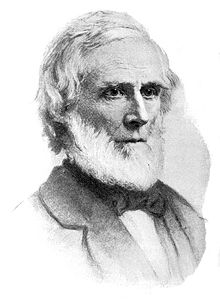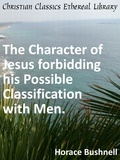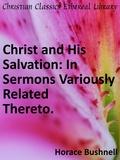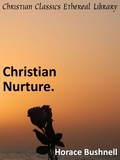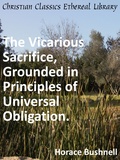Horace Bushnell
American Congregationalist theologian
Biography
Bushnell was born in the village of Bantam, township of Litchfield, Connecticut, on the 14th of April 1802. He graduated at Yale in 1827, in 1831 he entered the theological department of Yale College, and in 1833 was ordained pastor of the North Congregational church in Hartford, Connecticut, where he remained until 1859, when on account of long-continued ill-health he resigned his pastorate. Thereafter he had no settled charge, but, until his death at Hartford on the 17th of February 1876, he occasionally preached and was diligently employed as an author.
Four of his books were of particular importance: Christian Nurture (1847), in which he virtually opposed revivalism and "effectively turned the current of Christian thought toward the young"; Nature and the Supernatural (1858), in which he discussed miracles and endeavored to "lift the natural into the supernatural" by emphasizing the supernaturalness of man; The Vicarious Sacrifice (1866), in which he contended for what has come to be known as the "moral view" of the atonement in distinction from the "governmental" and the "penal" or "satisfaction" theories; and God in Christ (1849) (with an introductory "Dissertation on Language as related to Thought"), in which he expressed, it was charged, heretical views as to the Trinity, holding, among other things, that the Godhead is "instrumentally three -- three simply as related to our finite apprehension, and the communication of God's incommunicable nature." Attempts, indeed, were made to bring him to trial, but they were unsuccessful, and in 1852 his church unanimously withdrew from the local "consociation", thus removing any possibility of further action against him.
To his critics Bushnell formally replied by writing Christ in Theology (1851), in which he employs the important argument that spiritual facts can be expressed only in approximate and poetical language, and concludes that an adequate dogmatic theology cannot exist. That he did not deny the divinity of Christ he proved in The Character of Jesus, forbidding his possible Classification with Men (1861). He also published Sermons for the New Life (1858); Christ and his Salvation (1864); Work and Play (1864); Moral Uses of Dark Things (1868); Womens Suffrage, the Reform against Nature (1869); Sermons on Living Subjects (1872); and Forgiveness and Law (1874).
Bushnell was greatly interested in the civic interests of Hartford, and was the chief agent in procuring the establishment of the public park named in his honor by that city. An edition of his works, in eleven volumes, appeared in 1876-81; and a further volume, gathered from his unpublished papers, as The Spirit in Man: Sermons and Selections, in 1903. New editions of his Nature and the Supernatural, Sermons for the New Life, and Work and Play, were published the same year. A full bibliography, by Henry Barrett Learned, is appended to his Spirit in Man.
